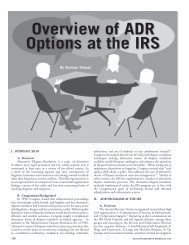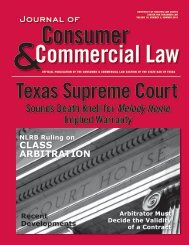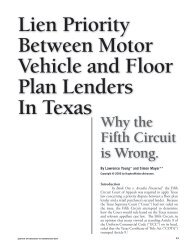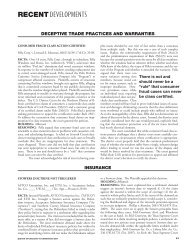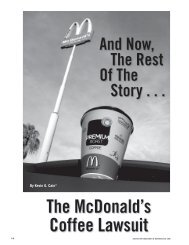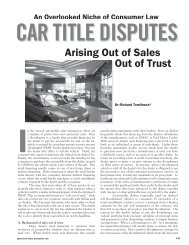Teaching Consumer Credit Law in an Evolving Australian Economy
Teaching Consumer Credit Law in an Evolving Australian Economy
Teaching Consumer Credit Law in an Evolving Australian Economy
Create successful ePaper yourself
Turn your PDF publications into a flip-book with our unique Google optimized e-Paper software.
History & Background<br />
From 1950 to 1971 consumer credit <strong>in</strong> the United States<br />
rose from $21.5 billion to $137.2 billion. 2 In November 1957,<br />
when Americ<strong>an</strong>s owed $48.4 billion <strong>in</strong> consumer debt, 3 the<br />
Georgia Supreme Court held “a consumer who voluntarily<br />
applies for <strong>an</strong>d obta<strong>in</strong>s credit impliedly consents for her creditor<br />
to take all reasonable action needed to collect the bill.” 4 Today,<br />
Americ<strong>an</strong>s owe some $2.5 trillion <strong>in</strong> consumer debt, 5 <strong>an</strong>d the<br />
bus<strong>in</strong>ess of collect<strong>in</strong>g the debt has grown exponentially.<br />
In 1976 there were 5,000 debt collection firms across the<br />
country, collectively return<strong>in</strong>g some $5 billion <strong>in</strong> outst<strong>an</strong>d<strong>in</strong>g<br />
debt; each firm employ<strong>in</strong>g <strong>an</strong> average of eight employees. 6 By<br />
2005 there were 6,500 debt collection agencies, collectively<br />
return<strong>in</strong>g $39.3 billion <strong>in</strong> debt, <strong>an</strong>d each hir<strong>in</strong>g <strong>an</strong> average of 70<br />
debt collectors. 7 While m<strong>an</strong>y <strong>in</strong>dustries are contract<strong>in</strong>g, the debt<br />
collection <strong>in</strong>dustry is expected to cont<strong>in</strong>ue to grow steadily; by<br />
19.34% from 2008 to 2018. 8<br />
The path to the massive consumer credit <strong>an</strong>d debt collection<br />
<strong>in</strong>dustries is not without a colorful history. In 1973 the Texas<br />
Legislature, cit<strong>in</strong>g the need to address unethical debt collection<br />
practices <strong>an</strong>d harassment of consumers 9 by “control[<strong>in</strong>g] <strong>an</strong>d<br />
curtail[<strong>in</strong>g] the practices used <strong>in</strong> the collection of debts,” 10<br />
enacted the Texas Debt Collection Act (“TDCA”). 11 In 1978<br />
Congress took up the issue. While some felt a federal law would<br />
<strong>in</strong>fr<strong>in</strong>ge on states’ rights, others argued state laws <strong>in</strong>tended to<br />
protect consumers from debt collectors were <strong>in</strong>adequate. 12 In the<br />
end Congress, f<strong>in</strong>d<strong>in</strong>g “abund<strong>an</strong>t evidence” of abusive, deceptive,<br />
<strong>an</strong>d unfair debt collection practices, 13 enacted the Fair Debt<br />
Collection Practices Act (“FDCPA”). 14 Prior to the enactment<br />
of the FDCPA, states were left to their own devises to regulate<br />
debt collection practices. 15 Today, it is not so much the right to<br />
collect a debt <strong>in</strong> issue, but rather the m<strong>an</strong>ner <strong>in</strong> which the right<br />
is exercised. 16<br />
Two major events triggered the furious growth of the debt<br />
collection <strong>in</strong>dustry. Dur<strong>in</strong>g the 1980’s the Federal Deposit<br />
Insur<strong>an</strong>ce Corporation beg<strong>an</strong> sell<strong>in</strong>g the debts previously owed to<br />
failed b<strong>an</strong>ks to third parties. 17 Secondly, the nation’s largest b<strong>an</strong>k<br />
at the time, B<strong>an</strong>k of America, also beg<strong>an</strong> sell<strong>in</strong>g <strong>an</strong>d assign<strong>in</strong>g<br />
old credit card debt to third party collectors. 18 Thus beg<strong>an</strong> the<br />
widespread practice of trad<strong>in</strong>g old debt, which cont<strong>in</strong>ues to grow<br />
today. And, because hundreds of comp<strong>an</strong>ies buy old debt with<br />
outdated, <strong>in</strong>sufficient, or <strong>in</strong>accurate <strong>in</strong>formation about debtors, 19<br />
the number of consumer compla<strong>in</strong>ts about the debt collection<br />
<strong>in</strong>dustry is grow<strong>in</strong>g faster th<strong>an</strong> the <strong>in</strong>dustry itself. 20<br />
The Federal Trade Commission (“FTC”) receives more<br />
compla<strong>in</strong>ts about the debt collection <strong>in</strong>dustry th<strong>an</strong> <strong>an</strong>y other<br />
category, 21 <strong>an</strong>d compla<strong>in</strong>ts are on the rise. In 2009 the FTC<br />
received 119,609 compla<strong>in</strong>ts about <strong>in</strong>-house debt collectors;<br />
a number which <strong>in</strong>creased by 17% to a whopp<strong>in</strong>g 140,036<br />
compla<strong>in</strong>ts <strong>in</strong> 2010. 22 As for compla<strong>in</strong>ts <strong>in</strong>volv<strong>in</strong>g third-party<br />
debt collectors, the FTC processed 88,326 compla<strong>in</strong>ts <strong>in</strong> 2009<br />
<strong>an</strong>d 108,997 compla<strong>in</strong>ts <strong>in</strong> 2010; <strong>an</strong> <strong>in</strong>crease of 23.4% <strong>in</strong> just<br />
a year’s time. 23 All <strong>in</strong> all, nearly half of all consumer compla<strong>in</strong>ts<br />
h<strong>an</strong>dled by the FTC <strong>in</strong>volve debt collectors.<br />
Comparison of the FDCPA <strong>an</strong>d the TDCA<br />
There are some import<strong>an</strong>t similarities, differences,<br />
adv<strong>an</strong>tages, <strong>an</strong>d disadv<strong>an</strong>tages to the FDCPA <strong>an</strong>d Texas law,<br />
which <strong>in</strong>cludes the TDCA <strong>an</strong>d common law torts unique to our<br />
state.<br />
Application<br />
The FDCPA applies to a person who “collects or attempts<br />
to collects debts… owed… or asserted to be owed [to] <strong>an</strong>other.” 24<br />
In short, the FDCPA applies only to third party, professional<br />
debt collectors. 25 Conversely, the TDCA applies to both debt<br />
collectors (<strong>an</strong>yone who collects debts 26 ) with special designation<br />
for third party debt collectors. 27 In 1995 the Supreme Court<br />
extended the def<strong>in</strong>ition of “debt collector” <strong>in</strong> the context of<br />
the FDCPA to <strong>in</strong>clude attorneys who regularly collect debts, 28<br />
<strong>an</strong>d the TDCA largely follows the Supreme Court’s decision<br />
when attorneys become subject to law regulat<strong>in</strong>g debt collection<br />
practices.<br />
Licens<strong>in</strong>g <strong>an</strong>d Bond<strong>in</strong>g<br />
The FDCPA does not have <strong>an</strong>y licens<strong>in</strong>g requirement for<br />
third party debt collectors. Conversely, the TDCA requires <strong>an</strong>y<br />
third party debt collector that collects debts from Texas consumers<br />
to obta<strong>in</strong> a $10,000 surety bond <strong>in</strong> favor of <strong>an</strong>y person damaged<br />
by a violation of the TDCA, <strong>an</strong>d register the bond with the<br />
secretary of state. 29 Texas law also allows the surety to be sued<br />
along with the third party debt collector, 30 <strong>an</strong>d a consumer need<br />
not show a cognizable <strong>in</strong>terest <strong>in</strong> the bond to ma<strong>in</strong>ta<strong>in</strong> a cause of<br />
action for relief. 31<br />
Verification & Disputes<br />
Both the federal <strong>an</strong>d Texas statues provide procedures for<br />
a consumer to dispute a debt. While both statutes only apply<br />
to disputes with third-party debt collectors, the procedures vary<br />
signific<strong>an</strong>tly.<br />
The FDCPA provides that a consumer may, with<strong>in</strong> 30<br />
days of receiv<strong>in</strong>g <strong>an</strong> <strong>in</strong>itial communication from the collector,<br />
write the collector <strong>an</strong>d dem<strong>an</strong>d verification of the alleged debt<br />
<strong>an</strong>d the name <strong>an</strong>d address of the orig<strong>in</strong>al creditor. 32 Generally,<br />
a debt collector must disclose the right to dem<strong>an</strong>d verification<br />
<strong>in</strong> its <strong>in</strong>itial communication to a consumer. 33 However, debt<br />
collectors always w<strong>an</strong>t consumers to pay more attention to the<br />
dem<strong>an</strong>d for money th<strong>an</strong> to the notice of the right to dem<strong>an</strong>d<br />
validation, 34 which c<strong>an</strong> create confusion for consumers. Once<br />
the <strong>in</strong>itial 30-day period passes the debt collector is no longer<br />
obligated to provide verification, <strong>an</strong>d the consumer loses the<br />
me<strong>an</strong>s by which to dispute a debt; a problem which has led the<br />
FTC to recommend Congress amend the FDCPA to require a<br />
more conspicuous notice to consumers of their rights. 35<br />
In contrast, the TDCA permits a consumer to dispute the<br />
accuracy of <strong>an</strong> alleged debt be<strong>in</strong>g collected by a third party debt<br />
collector, but does not prescribe <strong>an</strong>y particular timeframe. 36<br />
Upon receipt of a dispute under the TDCA the debt collector has<br />
30 days <strong>in</strong> which to admit the alleged <strong>in</strong>accuracy, deny the alleged<br />
<strong>in</strong>accuracy, or state it has not had enough time to complete its<br />
<strong>in</strong>vestigation (<strong>in</strong> which case the debt collector must correct its file<br />
as requested by the consumer). 37 While the debt collector may<br />
not have to produce validation documents to the consumer under<br />
the TDCA, the absence of a time period <strong>in</strong> which to file a dispute<br />
allows Texas consumers to dem<strong>an</strong>d a debt collector <strong>in</strong>vestigate the<br />
alleged debt at <strong>an</strong>y po<strong>in</strong>t dur<strong>in</strong>g the debt collection process – a<br />
signific<strong>an</strong>t adv<strong>an</strong>tage over the FDCPA.<br />
Enforcement Schemes <strong>an</strong>d Remedies of the FDCPA, the<br />
TDCA, <strong>an</strong>d Texas Common <strong>Law</strong><br />
Both the FDCPA <strong>an</strong>d the TDCA create a private cause of<br />
action for a consumer aggrieved by violations <strong>an</strong>d also provides a<br />
mech<strong>an</strong>ism of adm<strong>in</strong>istrative enforcement.<br />
Adm<strong>in</strong>istrative Enforcement<br />
Until recently, the FTC was charged with enforc<strong>in</strong>g the<br />
FDCPA. Follow<strong>in</strong>g the enactment of Dodd-Fr<strong>an</strong>k, the FTC<br />
<strong>an</strong>d the <strong>Consumer</strong> F<strong>in</strong><strong>an</strong>cial Protection Bureau [CFPB] share<br />
responsibility for enforc<strong>in</strong>g the Act, with the CFPB hav<strong>in</strong>g<br />
primary authority. 38 Because the CFPB has just begun to function,<br />
Journal of <strong>Consumer</strong> & Commercial <strong>Law</strong> 27



